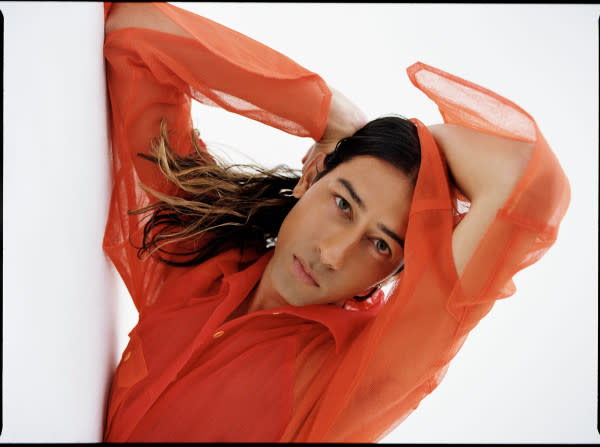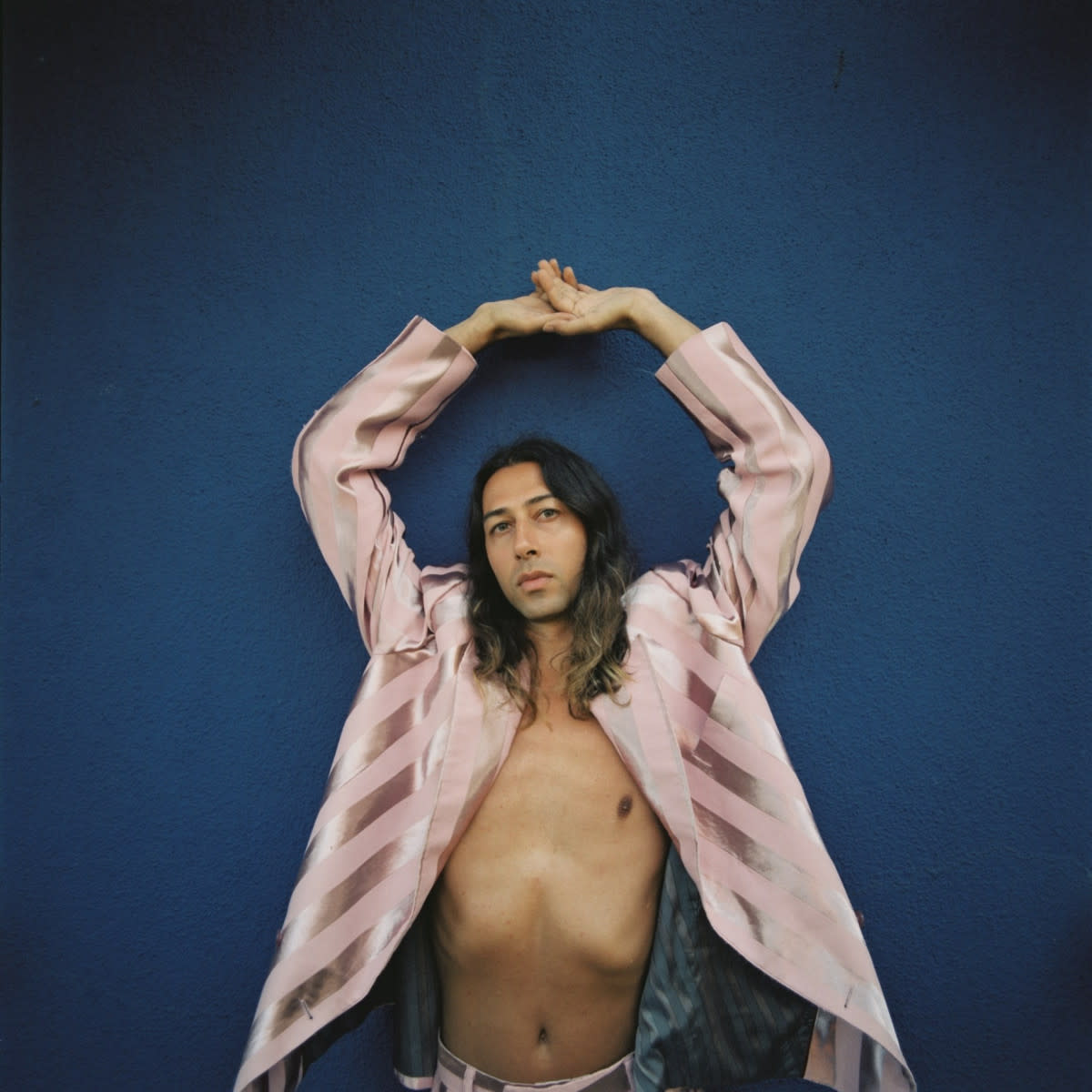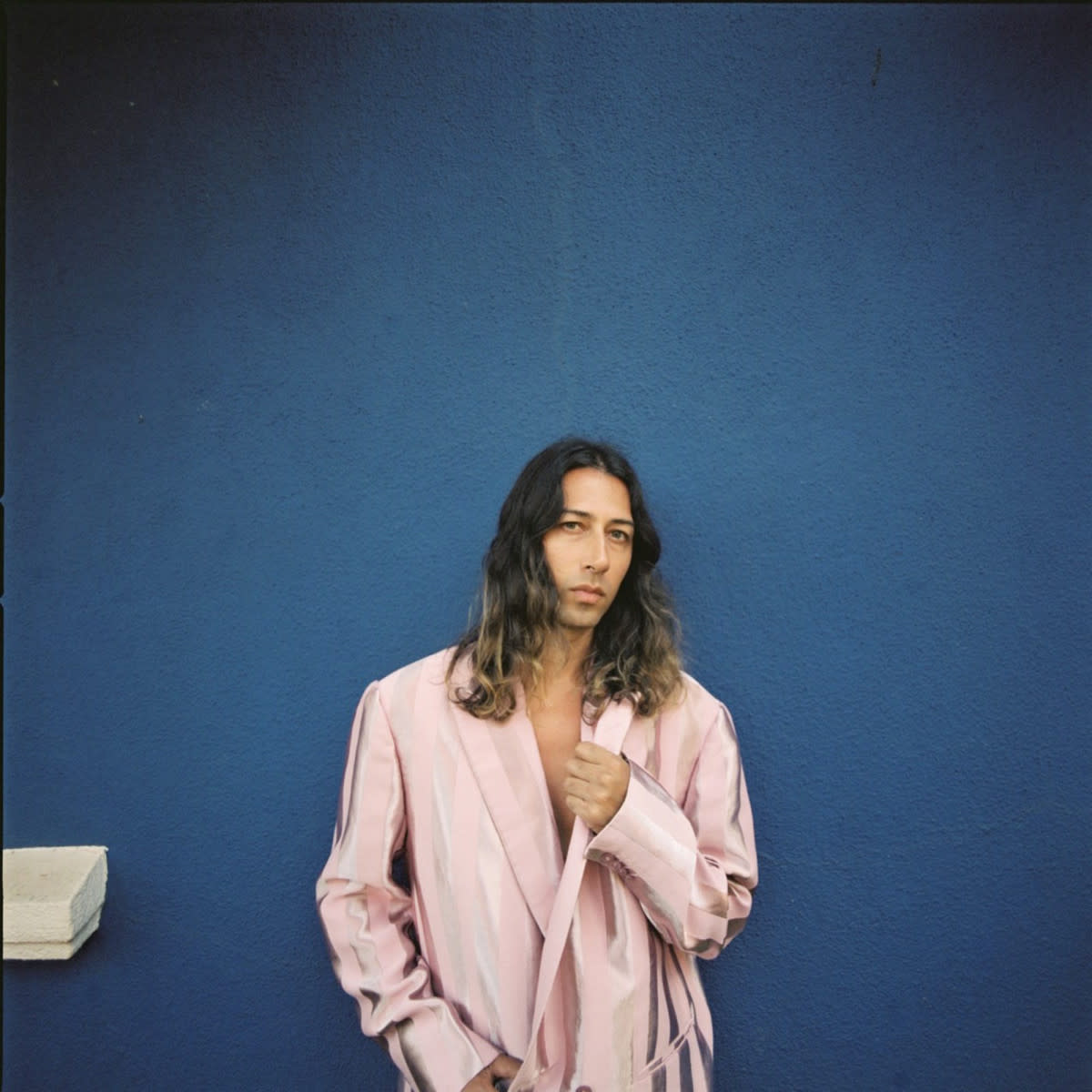In conversation: Kindness

Kindness is a Grammy-winning artist, producer, DJ and radio host who, outside of their own acclaimed music, has produced records for the likes of Robyn and Solange; directed music videos for Blood Orange and Grizzly Bear; starred in campaigns for Calvin Klein; and hosted lectures and radio shows for Red Bull Music Academy.
Feature portrait by Michele Yong. Additional photography by Phoebe Collings-James supplied by the artist.
It’s been around five years since Otherness was released, can you talk about your life in the years between then and now?
It’s a long time to cover, but I took some time off after making the record and ended up moving to New York. I finished working on [Solange’s album] A Seat at the Table, which was an incredible creative project to be a part of. That project started off in New Orleans, then Ghana and New York but there were also things happening in rural Louisiana and LA. I also worked on Robyn’s album Honey, which I luxuriated in a little bit. I started working on my own record two years ago, so that’s been an ongoing process throughout that time. Those were some big learning experiences and allowed for a lot of creative and artistic growth.
Did that erratic location swapping have any effect on your output?
I envy the DJs and producers I see on planes making a new beat in their headphones because I just can’t do it. The only place I can work is in a studio or in my own space—just being in motion alone is too much sensory overload so adding music on top of it is too much. What that has meant is an output that’s a little less, but more focused; it becomes more about getting the most out of yourself and the artist you’re working with. For example, the first few times I worked with Robyn was with some fast-moving producers. Eventually I said ‘why don’t we just work at our own tempo’ because we’d come to the realisation that we don’t get much work done after 6-7 hours in the studio; it’s just not productive. So it’s about learning as you go.
You’ve developed a fairly close network of artists who continue to collaborate—you mentioned Robyn and Solange as well as Kelela and Blood Orange. How has working in a group space influenced your own projects?
I’d be woefully cynical to suggest I ‘curated’ a friend group. But as it happens, everyone was a friend of a friend; Robyn was probably the only person where the request came out of the blue (though later we realised we had many friends in common). You trust your friends, you try to work with those who you admire, you try and put time and energy into good relationships with other artists. Maybe it’s also about being more discerning; rather than trying to be friends with everyone and have everyone like you (which is fundamentally impossible) you try and reach out to those kindred spirits who might also be a bit socially awkward and grumpy in the mornings or work-shy. I mean, those are three ways I would describe myself and apparently the people I work with can tolerate it.
I’m just thinking about how great those artists are and the expansiveness of the work they create. I’ve been friends with Dev (Hynes, AKA Blood Orange) for a long time and I’m just in awe of how much good music he can produce in a short space of time. Then there are artists like Solange and Kelela who have taken longer to refine a body of work they want to present in a highly owned and polished way. What really shook me after a while was how to go back to singing on my own work after collaborating with those artists and incredible vocalists. It becomes the norm; you become used to hearing people bend emotion and pitch and notes into a performance but I’m not sure I can do it to the same calibre. That drove me a bit crazy because you understand you can’t always borrow a friends voice and ask them to be your conduit. Sometimes you have to grit your teeth and sing it yourself.

Have you developed ways to overcome insecurity in the studio?
Those anxieties and neurosis will always be there no matter who you are. Often it’s healthy, but knowing how to play to your strengths and weaknesses is important to the creative process, as is being vulnerable enough to know you can’t be perfect at everything. There’s something very human in wanting to outperform every time you deliver something, but you just can’t do it. You can only hope people see the humanity in what you do.
We’re talking just a few days after finishing this two-year album recording process for Something Like a War. What is that moment of exhalation like?
It’s an immensely strange feeling to finish something that has generated so many joyful but also enormous-seeming decisions. I genuinely think making an album is a process of at least 100,000 decisions, where every time you work on a song you have to make a categorical decision that will change it for good. It’s an agreeable pressure, but pressure nonetheless. And this feels now like the most enormous exhalation where I don’t know what to do with the energy. I’m glad to be going on tour with Robyn this week because I’ve also seen friends go a little stir-crazy when they have to sit on their album for a few months with nothing much to do.
This is all heightened by the idea that I don’t make a huge amount of music. I’d made two albums with twelve tracks each and a handful of songs for other people. I spoke to a friend recently to see if they had a set number of songs they think they’d make in their career, because I don’t think I will hit even 75. I’d be happy to just release 3-5 albums and be proud of them. I don’t want to push my luck.
“You can't always borrow a friend's voice and ask them to be your conduit. Sometime's you have to grit your teeth and sing it yourself.”
Kindness
As a body of work, Otherness was very much about identity and you have detailed the challenges diverse voices face in the music industry. Do you think much has changed in the time between these records?
It’s massively different. As a mixed-race, queer musician, the landscape of music media was quite intimidating and hostile when I first released music. I just remember the inherent macho-ness and hostility; for example, a reviewer said the women I performed with at SXSW looked as if they had bad smelling feet because they were barefoot, while another said we made too many jokes and we should be more dignified. I was surprised by the distinct lack of generosity, which had often come from a middle-aged white guy who had started reviewing The Slits and Suicide in the 70s and was now writing for mainstream music press with an air of disgruntledness in their criticism.
Now, there has been a paradigm shift. I see the number of women and people of colour in the music press and think ‘OK, if you want to critique my work harshly I’m more welcoming of your opinion and ideology’ because I believe we’ve come from a similar place both in terms of thinking and community and how we’d hope to treat each other. In turn, that allows you to be more vulnerable and more reflective about identity. It allows me to make music where maybe I’m going to fuck up, or my voice doesn’t sound as good as it should or my songwriting is too meandering, but at least it’s honest. This world you put something into is a little more generous and thoughtful than it once was.
Do you feel a certain pressure to represent the communities you’re a part of?
I’m just being myself. The best thing I can do is, instead of being didactic and trying to be the embodiment of all those qualities, I can just exist with honesty. I think the most useful way I can be honest is to just continue being part of the conversation with other people and offer a platform to those in marginalised communities who might need a light shined on the great work they’re doing. That’s why I DJ, I go to parties, I hang out with friends and we talk and try to put the world to rights. But maybe the person who is more helpful in interpersonal relationships is more useful than someone trying to be a figurehead on a public level, and I don’t think I’m smart enough to do that anyway.
I’m interested in the visual side of your output, both from your own projects and that of others. Do you have a set aesthetic in mind for directing and photography?
I love how empowered so many artists are to be in charge of their own visuals, and that’s part of the democratisation of everything that’s happened in the past 10 years of music. I don’t think I’m that precise about being influenced by a particular art style or moment in cinema, it’s just more about the ways you produce when you have the means. The budgets for independent label music videos are 5% of what they once were, so you’ve got to be creative. That’s probably the most dominant aesthetic force in everyone’s work—how to make incredible results with no money. Of course, there are a few people who care to make visually complex and demanding productions, but for the rest of us it’s just thinking about things you’ve seen and what you can do with a two person crew.
Take the video I made for Blood Orange in Guyana for Chamakay, for example. We shot that on film, I didn’t have a video monitor so I couldn’t see what we had filmed, we had no backup, no second camera, nothing. I absolutely should not have come back with any footage because it was just crazy. I’m proud of it, but I might start leaving it back to professionals because I’ve used my nine directorial lives on that one shoot alone.
What did owning the intellectual property rights to your music mean for your creative freedom?
Realistically, you can impose yourself on any label or infrastructure you work with. But what it did—and what was innately positive—was it gave me a huge kick up the arse as to how this business works and where my responsibilities are as a self-employed person. When you’re a musician the only quantifiable thing you have are the songs you write and the performances you give. What I try and encourage creative friends is to understand how your own business works. If you’re an independent artist, then know what’s in your contract; if you’re a self-released artist, know how you should get paid every month; if you’re signed to a major label, understand the leverage you have.
Can you talk about how academic sources play into your work?
For better or worse, I have a habit of reading what my friends are saying on Twitter more than major news sources. This material is really valuable and doesn’t come with the filter of the institution or traditional academic learning. That’s where I learn the most, with people either of a generation older or younger than my own, sharing knowledge and sources and citations and facts and not just spurious stuff people make up as a personal opinion. Growing up in the UK, you realise the system of education will only really show you what it wants you to see, and God knows how they’re going to document this period in history with people literally ruining the lives of the next generation for no real reason at all. But that goes back to 20th century British history and we weren’t taught that in school. I was never really active on social media previously but just in the last five years between records I feel that I’ve learnt an enormous amount which has given me a lot of context for who I am and what I believe.

As you said, it’s information curated by the community and not the institution.
That’s what’s crazy. I’m in a WhatsApp group with South-Asian musicians where we share information, and we have a Google doc where we post links with citations and articles and academic papers and documentaries. We’re all DJs or producers or artists or singers, but I’m just glad to see people energised and proactive in that respect.
It’s become part of a more interesting and reflective side of pop-culture where it’s not just pop-culture that delivers a song, but added meaning when you realise it’s come from someone who cares about things as much as you do, and they’re doing their research or going to a protest or writing to their government or highlighting some bullshit inequality somewhere. If it exists in a music space, that’s a good first step. All of this is to say that in a funny way the world has gotten better in the last five-six years because people ostensibly seem to care more, and I’m more engaged than I ever was before as a result.
Your Red Bull Music Academy show featured interviews with a huge cross-section of musicians and artists. What did you learn from them?
It showed me how artists can have multi-faceted careers with artistic multitudes; for example, Jimmy Douglass was mixing Roberta Flack in his teens, Missy Elliott and Aaliyah in the 90s and now Pharrell and Blood Orange today; doing something incredible in every generation and making those pointers of how to have a fulfilling and long life doing something you enjoy. Eric Johnson was a photographer originally shooting the likes of Biggie Smalls, and is now shooting younger queer artists in New York in his own loft in Midtown; he’s doing incredible work and is very present in his community. There were some older guests I was specifically interested in talking to just to see how you could have done something interesting in the 70s and 80s and yet still be at the top of your game now. There is a lot to learn from that no matter your profession.
Two really important lessons I believe we’ve touched on in this interview is that for people whose work I appreciate, they have just forged friendships with like-minded people and not cared if people didn’t like their work—they stayed curious over 30- 40 years. The other is the importance of being part of a community, which is hugely valuable especially when things aren’t feeling so good. You need good hearted people around you to keep you going.